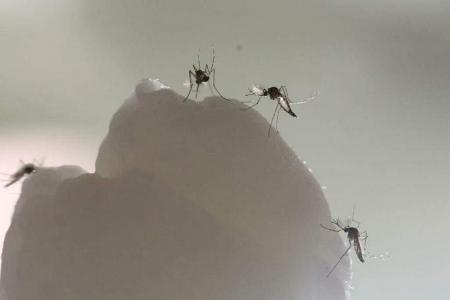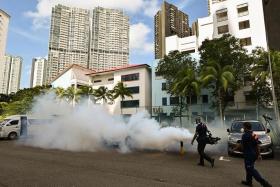3 Zika cases detected in Kovan; doctors urged to test patients for the virus
Three people who live or work in Kovan have been found to be infected with the Zika virus, the authorities said on Friday, in what are the first cases of the mosquito-borne virus in 2023.
The Ministry of Health (MOH) and the National Environment Agency (NEA) said in a joint statement that two of the cases are currently recovering at home, while one is in stable condition in the hospital. None of them are pregnant.
In 2022, there were two Zika cases reported.
MOH has alerted doctors to be vigilant and test for Zika among patients with symptoms, especially those who work or live in the Kovan area, the statement said.
Family members of those infected have also been advised to monitor their health closely for the next two weeks.
The ministry also advised Kovan residents, especially pregnant women, to monitor their health and seek medical attention if unwell. They should also inform their doctors of the location of their residence and workplace.
Zika is a virus infection transmitted by the bite of an infected Aedes mosquito. The insect is also a carrier of the dengue and chikungunya viruses.
“While MOH and NEA have stepped up precautionary control measures, we cannot rule out that there are further cases, as most infected persons may display mild or no symptoms,” the statement said.
The residential premises of the area are being sprayed with insecticides to eradicate any adult mosquitoes, the statement said.
Larviciding – a method of destroying mosquito breeding – is also being conducted.
Residents are urged to allow NEA officers to inspect their premises and conduct spraying of insecticide to remove adult mosquitoes and stop the chain of Zika transmission, the statement said.
NEA officers and community leaders will also conduct outreach activities to raise awareness of the virus.
Residents who live in Zika and dengue cluster areas are also reminded to spray insecticide in dark corners around the house, apply insect repellent regularly and wear long-sleeve tops and trousers.
In 2016, MOH confirmed the localised community spread of the Zika virus in Singapore.
That same year, the World Health Organisation declared the Zika outbreak a public health emergency.
Symptoms of the virus include fever, rashes, body aches, headache, red eyes and, occasionally, nausea and vomiting.
These usually develop within three to 14 days after the mosquito bite, and often last between two and seven days.
In rare cases, Zika can cause microcephaly – a condition where babies have very small heads and undeveloped brains – in unborn babies of pregnant women.
The authorities advised men who are infected to practise safe sex, or abstain from sex, for at least three months after recovery, while recommending that women should do so for two months.
Get The New Paper on your phone with the free TNP app. Download from the Apple App Store or Google Play Store now


